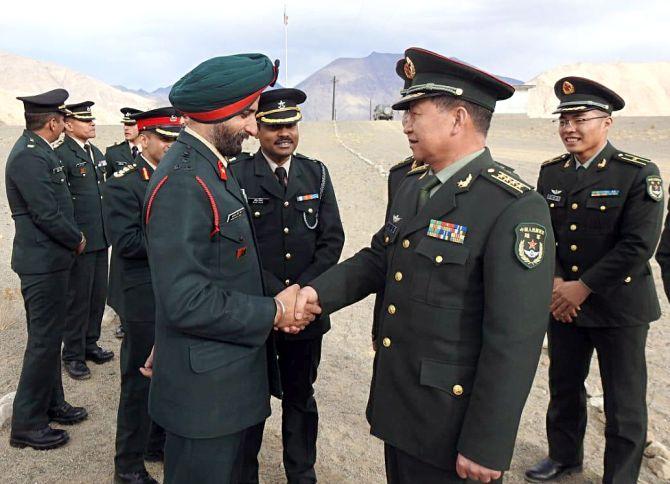'One must remember that a dragon has a forked tongue,' warns Vivek Gumaste.

The brazen intrusion by China's People's Liberation Army at Pangong Tso lake in Ladakh and the Naku La region near Tibet along the Line of Actual Control with India, though ostensibly a border altercation, masks a larger game plan.
Namely, the intent to discipline who it thinks is an errant upstart neighbour who dare steal its sheen as the predominant power in Asia and a rising global superpower, not to speak of its audacity in fostering closer military ties with Washington, China's only global rival.
Chinese antipathy towards India is not the derivative of mundane secular differences like border disputes or of recent origin. Rather, it is a deep-seated, intrinsic and historic trait that stems from a medieval mindset that subscribes to dated notions of intrinsic superiority and inferiority; a warped perspective that imbues it with a false sense of entitlement to global hegemony and the presumptuous authority to censure 'underlings like India'.
This trait was evident even in the 1950s, when both nations, India and China, were fledgeling States out to make their mark in a post-colonial world.
Much to China's chagrin, in those times, India had the edge, thanks to Mahatma Gandhi's spiritual aura and Jawaharlal Nehru's stewardship of the Non-Aligned Movement.
Zhou Enlai, China's first premier, reacting to India's claim of having introduced China to NAM, once remarked that he was surprised at the 'effrontery of a third-rate power like India claiming to introduce to the world the prime minister of a first-rate power like China'. (Kuldip Nayar. India, The Critical Years).
The 1962 War in which India suffered a humiliating defeat was the practical demonstration of China's India policy of cutting India down to size.
Sarvepalli Gopal corroborates this in his authoritative biography of Nehru by quoting a Chinese official who explains that the prime objective of the 1962 War was to demolish India's 'arrogance' and 'illusions of grandeur' and that China 'had taught India a lesson and, if necessary, they would teach her a lesson again and again'.
For China, the time appears ripe to teach India another lesson.
An unexpected confluence of rapidly developing world events over the last few months have pushed an unabashed bully like China into an unenviable position of unaccustomed vulnerability.
China's mishandling of the coronavirus crisis tells of reckless and deceptive irresponsibility in lieu of staid leadership.
China's world image stands irrevocably dented. No longer the new hero of the emerging world, it is being framed as the villain of the piece intent on pursuing self-interest at the cost of endangering thousands of human lives.
Not to be discounted is the material consequences to China of this misadventure: A cascading negative impact on its economy.
Add to this the talk of India being the natural alternative for global investments in the post-Covid era and the picture of China's insecurity becomes complete.
Moreover, China has noted with growing concern, a resurgent India's new-found confidence under Prime Minister Narendra Damodardas Modi's captaincy.
The reorganisation of Jammu and Kashmir, increased proximity to Washington, and strategic alliances with other countries inimical to China like Japan have unsettled China.
India's support for the investigation into China's role in the COVID-19 crisis is another irritant in this equation.
With the world's attention distracted by a deadly pandemic, China callously envisions an opportunity to turn adversity into advantage and consolidate its geo-political ambitions.
- Border skirmishes: China's strategy to unsettle India
- Beware of opportunist China
- 'India's rating downgrade is done at China's behest'
China is both testing and playing international diplomatic waters in this India-China standoff.
In targeting India, China sees rich dividends. In one stroke it can demolish India's ambitions of replacing China as an industrial hub, mollify its all-weather friend Pakistan and challenge US determination to counter China by proxy.
China's official position as evidenced by opinion pieces in the Global Times -- a tabloid of the Chinese Communist party -- has been a jumbled mixture of conflicting expressions: Runaway hubris, military bluster and sober but sanctimonious platitudes advocating India-Chinese cooperation.
The Line of Actual Control is not a well demarcated boundary, but a nebulous line open to vary interpretations. Nevertheless, China paints India as the aggressor.
Long Xingchun categorically asserts (external link): 'Unlike previous standoffs, the latest border friction was not caused by accident, but was a planned move of New Delhi.'
And nearly 60 years later China feels it necessary to remind India of its disastrous defeat in the 1962 War; a veiled threat as to what awaits India if it chooses to confront China.
'The international environment for China is much better than it was in 1962 when India started and was crushingly defeated in a border war with China. In 1962, the national strength of China and India were comparable. Today by stark contrast, China's GDP is about five times that of India.'
Another op-ed (external link) by Wang Wenwen refers to 'illegally constructed defence facilities across the border into Chinese territory in the Galwan Valley region...'
'To what extent Trump's personal Twitter account reflects the will of the White House remains to be seen. For the US, a conflicting China-India relationship serves its interests. Washington believes the combined strength of Beijing and New Delhi could impair its interests in Asia and beyond,' Wenwen writes.
'An opportunist US has never given up its attempt to drive a wedge between China and India,' Wenwen adds. 'The administration of former president Barack Obama repeatedly stated that it saw India as part of its rebalancing strategy aimed at China, and the Trump administration emphasises India as a major pillar in its much-touted Indo-Pacific concept.'
Emphasising China's military advantage to intimidate India, another report (external link) highlights the induction of sophisticated new India-specific armory: 'Since the Doklam standoff with India in 2017, the Chinese military has expanded its arsenal with weapons like the Type 15 tank, Z-20 helicopter and GJ-2 drone that should give China the advantage in high-altitude conflicts should they arise.'
However, China must also be cognisant of the fact that 2020 is not 1962. India may not be able to match China's military numbers, but has enough military capability to give China a bloody nose in a face to face confrontation.
An outcome that would be detrimental to China's global ambitions. China has more to lose in this stand-off. One would counsel pragmatism.
Despite all this brash bravado, there is an undeniable hint of definite Chinese trepidation with regards to the India-US strategic partnership. In a span of one week at least three major opinion pieces have been published commenting on the issue -- evidence of China's apparent desperation.
These articles attempt to portray the US as a selfish, unreliable partner, exhort India to act independently, warn of disastrous consequences if India fails to fall in line and call for better India-China understanding.
Long Xingchun reiterates the same sentiment: 'Even those pro-US Indians will not count on the Trump administration, which advocates the 'America First' policy, to really back India. The Trump administration encourages India to be tough on China so as to provoke and profit from the China-India disputes.'
Another leader article (external link) adopts a carrot and stick approach warning India of economic destitution if it followed Washington's path and promising to aid India's economic recovery post Covid.
'If in a new Cold War, India leans toward the US or becomes a US pawn attacking China, the economic and trade ties between the two Asian neighbors will suffer a devastating blow. And it would be too much for the Indian economy to take such a hit at the current stage.'
The same article speaks of 'China's tone of maintaining a cooperative relationship with India' and 'help' to aid its economic recovery.
Finally, Long advises: 'As an ancient civilisation, India is wise enough to avoid understanding China through biased US lens. It is in the interests of India to understand the real China and make correct and strategic judgments on this basis.'
By the same token, China must stop viewing India through the eyes of its all-weather partner in crime -- Pakistan. India on the other hand has always maintained a sense of balance in its relationship with China.
India has no desire to rival China or engage in a military conflict.
The India-US strategic partnership is recent phenomenon -- the direct consequence of China's continued efforts to contain India and its unfettered support of Pakistan's shenanigans.
China must realise that in the world of hard realpolitik there are no permanent friends and no permanent enemies.
If China is really sincere about 'maintaining a cooperative relationship with India', then it must walk the talk.
First, to demonstrate its good intentions, China must disengage completely from Pakistan's terrorist activities (after almost a decade it agreed to the listing of Masood Azhar as a global terrorist) and distance itself from Pakistan's claim to Kashmir as a reciprocal gesture for India's recognition of Tibet -- a move that would dampen Pakistan's antics and usher more stability into the region.
Facilitation of India's entry into the Nuclear Suppliers Group and endorsement of India's quest for a permanent United Nations Security Council seat would be other confidence building measures.
An all-out war appears unlikely.
The Chinese foreign ministry has stated that the 'overall situation in the China-India border area is stable and under control, and the two countries are capable of resolving border issues through dialogue and negotiations.'
Defence Minister Rajnath Singh concurs.
However, this talk of cooperation must not lull India into a false sense of security.
All these utterances emanating from Beijing are eerily similar to what preceded the 1962 conflict.
India must be militarily prepared for the worst while welcoming mutual cooperation.
One must remember that a dragon has a forked tongue.










